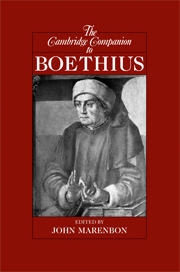Book contents
- Frontmatter
- Introduction: reading Boethius whole
- Part 1 Before the Consolation
- 1 Boethius’ life and the world of late antique philosophy
- 2 The Aristotelian commentator
- 3 The logical textbooks and their influence
- 4 Boethius on utterances, understanding and reality
- 5 The Opuscula sacra: Boethius and theology
- 6 The metaphysics of individuals in the Opuscula sacra
- 7 The medieval fortunes of the Opuscula sacra
- Part II The Consolation
- Appendix: Boethius’ works
- Bibliography
- Index: References to Boethius' works
- General Index
- Series list
7 - The medieval fortunes of the Opuscula sacra
from Part 1 - Before the Consolation
Published online by Cambridge University Press: 28 July 2009
- Frontmatter
- Introduction: reading Boethius whole
- Part 1 Before the Consolation
- 1 Boethius’ life and the world of late antique philosophy
- 2 The Aristotelian commentator
- 3 The logical textbooks and their influence
- 4 Boethius on utterances, understanding and reality
- 5 The Opuscula sacra: Boethius and theology
- 6 The metaphysics of individuals in the Opuscula sacra
- 7 The medieval fortunes of the Opuscula sacra
- Part II The Consolation
- Appendix: Boethius’ works
- Bibliography
- Index: References to Boethius' works
- General Index
- Series list
Summary
Boethius wrote five treatises of Christian theology grouped under the title Opuscula sacra. At least three of them - among which the two most important ones, the De Trinitate (OS I) and the Contra Eutychen et Nestorium (OS V) - deal with Trinitarian or Christological issues. These treatises came to take a central part in medieval thought and had a surprisingly wide influence upon it. During the Middle Ages, the danger of heresies was a less urgent topic than it had been during the first centuries of Christianity, a time marked by frequent doctrinal disputes. Arius and Nestorius were no longer a danger for a now established dogma and, in the Latin West, the Church was unified. In consequence, the Opuscula sacra were no longer topical because of their rooting in doctrinal controversies; they appeared less as a display of militant strength in the struggle of orthodoxy against heresy. Once transferred into the intellectual context of the medieval Latin West, they took on a new life, distant from the task of defending Christian dogma, but central to philosophical thought. From the beginning of the Middle Ages onwards, the influence of the Opuscula sacra reached beyond dogmatic theology, into the fields of logic, ontology andmetaphysics. For 400 years, from the ninth to the twelfth centuries, the Opuscula were among the reference texts of philosophers, beside Aristotle's Categories (or its paraphrase, the Categoriae decem) and Peri hermeneias, and Porphyry's Isagoge.
- Type
- Chapter
- Information
- The Cambridge Companion to Boethius , pp. 155 - 178Publisher: Cambridge University PressPrint publication year: 2009
- 3
- Cited by



